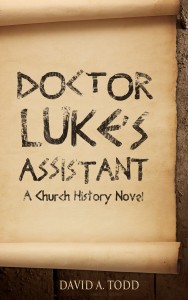I need to make this one more post about the research that went into the  writing of Doctor Luke’s Assistant, though I reserve the right to address the subject again should something come to mind. And I apologize for taking to so long to post this. I began it Sunday evening, on my laptop, and the page froze after I typed “I” to start and the drop-capital “I” appeared. That’s the second time that happened. I’m not sure why the laptop doesn’t like those drop capitals.
writing of Doctor Luke’s Assistant, though I reserve the right to address the subject again should something come to mind. And I apologize for taking to so long to post this. I began it Sunday evening, on my laptop, and the page froze after I typed “I” to start and the drop-capital “I” appeared. That’s the second time that happened. I’m not sure why the laptop doesn’t like those drop capitals.
Perhaps I shouldn’t write this, but I want to be honest about what I researched and what I assumed. Here are a couple of things I assumed.
– The Roman archives in Jerusalem, where Augustus worked for Hermalius. I assume some kind of archive existed in Jerusalem. It makes sense that one did. But I don’t know that for certain. Caesarea and (especially) Damascus were more important administrative cities at that time. It’s possible that one or both of those cities would have held archives before Jerusalem did.
Or maybe the Romans weren’t the meticulous record keepers I think they were. We know they collected taxes, and taxes require records. We know they took censuses, probably for the purpose of identifying taxpayers, and censuses require records. We know governors of the conquered provinces were judged based on performance, and documenting that performance required records, not only of taxes but also of disturbances, crime, and rebellion. That such an archive existed in Jerusalem makes sense, since that was the main Jewish city. Damascus would have been dominated by other nationalities (probably Arabs) and Caesarea was more of a Roman colonial city.
That records would deteriorate with time makes sense. Ink is not permanent. The paper they used, typically in scrolls rather than in codex form, was of papyrus or other such fragile material. So I don’t know for sure that the Romans hired copyists to copy records to keep them fresh, but it makes sense.
– The corrupt prison system. I did some research here, and found that the Roman prison system was corrupt. The wealthy regularly paid their way out of trouble, or out of prison if they were unfortunate enough to find themselves there. Bribes were paid. I don’t know if it would have happened exactly as I have it with Augustus obtaining the release…well, maybe I shouldn’t give away that much of the story. But this makes sense, based upon research I did, though admittedly limited research.
– The way Luke and Augustus were greeted in Nazareth. This is based somewhat on my cultural understanding of the area, and assuming people today have some characteristics that they did in the 1st Century. Them being mobbed by the crowd, with everyone taking sides in the argument, is something that is seen over and over in the Middle East today. I didn’t encounter it personally during my years there, but I had several friends who did, and they described it to me. It seems times like those are perfect for everyone to express their opinion.
The way the crowd dispersed when the Roman officials came up also makes sense. Someone at the edge of the crowd would have seen them, and would have said “Soldiers!”, and the crowd would quickly fade away to the shops. The one thing that might not be accurate is the presence of soldiers in Nazareth. It was such an insignificant town, why would Roman soldiers have been there? I don’t think, at this time in the occupation, that there was a soldier in every town or on every street corner. The larger cities and towns, especially those with trade going on, would need soldiers stationed there, but Nazareth? Can anything significant happen in Nazareth?
But put soldiers there I have. If someone wants to call me out as being not true to what was probably the situation in the region at that time I plead guilty, and ask for your indulgence. Hopefully the book is still good with that little (probable) historical inaccuracy.